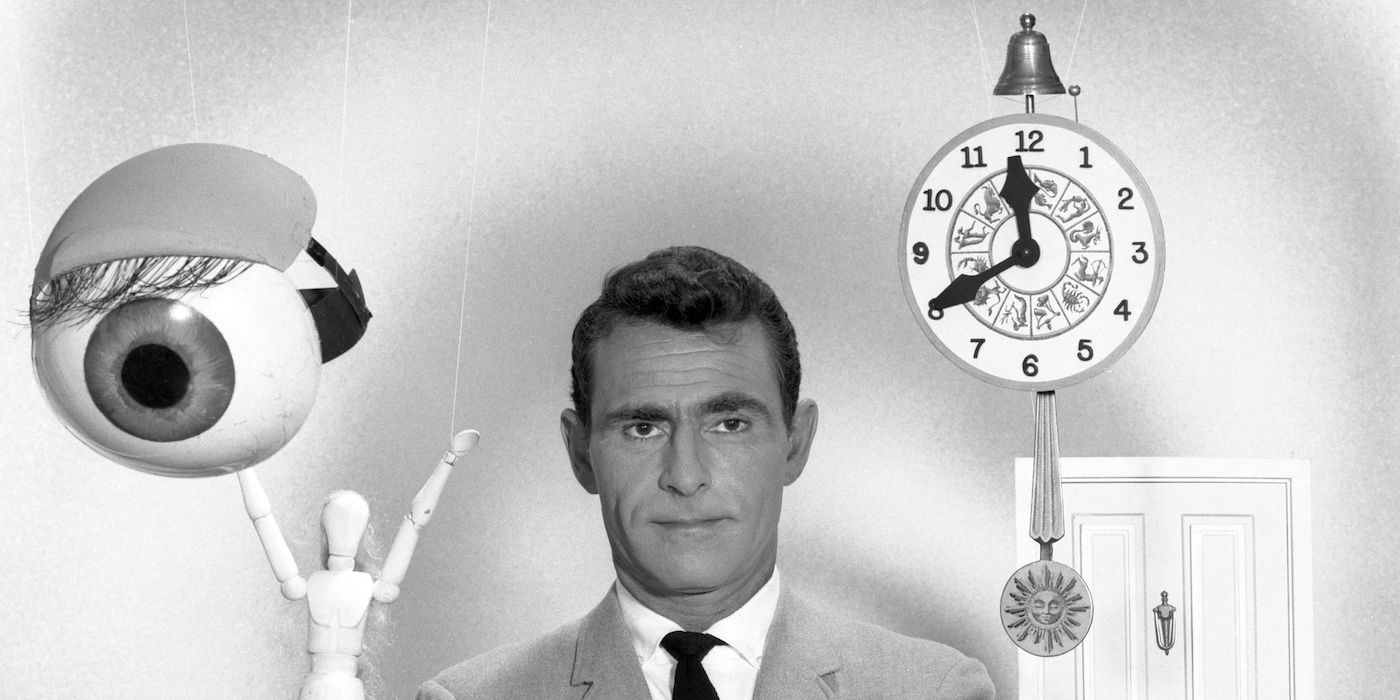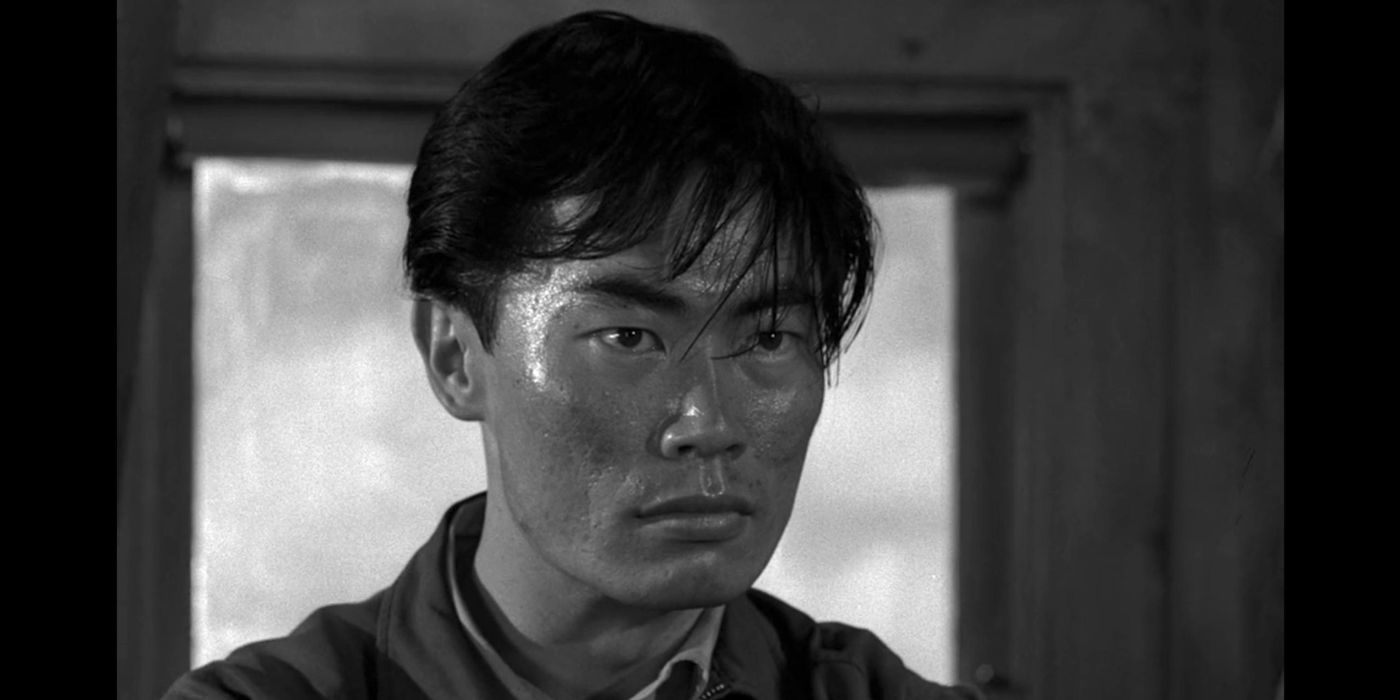The Big Picture
- “The Encounter” episode of The Twilight Zone tackles themes of wartime trauma, racial disharmony, and racism, but fails to present a fair representation of the Asian-American character, Arthur.
- While the episode effectively portrays the lasting effects of subtle racism, its mishandling of narrative choices adds to racist beliefs it meant to condemn, leading to its removal from syndication.
- The episode could have been a powerful examination of social commentary, but its underdeveloped Asian-American character and harmful stereotypes undermine its potential impact. It falls short of delivering its intended message effectively.
Though The Twilight Zone has never been a stranger to tackling weighty social themes, one episode handled its subject matter in such a way that led to it becoming pulled from syndication by CBS for over 50 years. The episode in question was Season 5’s “The Encounter,” a story of wartime trauma, suppressed prejudice, and racial disharmony. The episode’s apparent good intentions in portraying the crippling consequences of racism were mostly undermined by its mishandling of the same theme. When Fenton (Neville Brand), an American veteran, invites Arthur (George Takei), a Japanese-American gardener, up to his attic to share a beer, the two men each grapple with their trauma from World War II and their racially-prejudiced perceptions of each other — tragedy intervenes and brings the men to a cruel fate.
There’s plenty that “The Encounter” does right, namely its method of portraying the lasting, trickling effects that subtle acts of racism have upon a society. The problem, though, and the reason why civil liberties groups found the episode harmful, is that it fails at presenting a fair representation of Arthur and the Asian-American demographic he was meant to represent. Utilizing a horror lens to take on themes of racism can be particularly effective, as we’ve seen in flicks like Get Out, The People Under the Stairs, Candyman, and, even if unintentionally, The Night of the Living Dead. The episode is terrifying in a way that many Twilight Zone entries are: it’s a horrific examination of man’s folly, the ugliness that hides beneath the surface of American society and human nature. The problem is that, especially for the time, the episode makes narrative choices that only add to the idiotic racist beliefs that it meant to condemn.
Why Was “The Encounter” the Only ‘Twilight Zone’ Episode Banned From Syndication?
Airing only 20 years after the U.S.’ shameful incarceration and forceful relocation of massive numbers of Japanese Americans into internment camps during World War II, “The Encounter” ultimately stumbles over itself while portraying its character of Arthur Takamori. From the start, at least, Arthur is portrayed fairly enough: he’s just a professional gardener looking for some work and finding it on Fenton’s property. He’s uncomfortable with the way his white neighbor talks to him, deeming the man’s racist condescension as wanton acts of hatred. You see, Fenton has a tendency to call Arthur ‘boy’ in a way that suggests an unspoken belief of superiority. He makes ignorant assumptions that Arthur, an American-born man, can naturally read kanji script. He throws about slurs as if he genuinely doesn’t think them to be harmful. He belittles Arthur’s physical strength when he can’t open a mysteriously sealed door.
Arthur, meanwhile, expresses his discomfort. “I get bugged by ‘boy,'” Arthur retorts to Fenton’s condescension, “I’m a full grown man. I work for a living. I answer to Arthur, Takamori, or—believe it or not—Mr. Takamori.” He doesn’t like being there. Why would he? Fenton’s ceaseless microaggresions are exhausting. Even if Fenton’s so-called hospitality of offering the man to share a beer is, on paper, the neighborly way of being, it’s too heavily eradicated by the man’s insensitivity-slash-outright-racism.
On one hand, this blatant portrayal of racial disharmony assuredly proved to be a provoking, uncomfortable experience for viewers, but it isn’t the problem. The issue comes in near the start of the third act, when Arthur reluctantly admits that his father, a Japanese-American man working construction on Pearl Harbor at the time of the Imperial Navy’s attack, was actually a spy who gave directions to the planes of where to attack. Arthur’s shame and trauma is unbearable, and it serves as a crucial part of his undoing, but it’s also rooted in the same racist notion that led to the creation of the internment camps in the 40s. It feeds into the absurd and baseless assumption that those of non-European ethnicities are naturally less dispositioned to be good “Americans,” whatever that really means. It’s an unfortunate twist in Martin Goldsmith‘s otherwise poignant script that ultimately led to the episode’s removal from syndication.
“The Encounter” Owed Its Character More Than It Gave
Sure, it’s only 20-ish minutes, but “The Encounter” had the potential to take on its themes with more credibility and honesty. Underwriting Takei’s character is the episode’s fatal flaw, especially when comparing to the weight given to Brand’s character. Brand, the episode’s white man, is a product of cultural and militaristic brainwashing that led him to form insidious racist beliefs. The acts of wartime violence that plague him with inescapable trauma were, he claims, simply orders that he was carrying out at the demand of powerful, hateful men. He claims that his attitude towards Asian-Americans is purely the result of the way that such demographics of people are culturally portrayed. With the war over, the 60s tumultuously arriving, and progressives and civil liberties groups at long last making strides to convince white Americans that equality and understanding is the only reasonable or respectable path, Fenton nevertheless remains confused. This overdue cultural progression is in inherent conflict to what he was force-fed during the war.
Fenton later admits to Arthur that he drinks a little too much. He hints at a pervading alcoholism that estranged him from his wife and lost him his construction job. The reason, he claims, is not only his haunting trauma from his wartime stint in Okinawa, but the way that the outright horrors of war violence become all the more apparent when racism is eradicated from the equation. Fenton’s character, as detestable as he is, is a well-written character that serves a metaphorical point aiding the episode’s intended message. Arthur, meanwhile, is tragically underwritten.
Arthur’s identity is ultimately distilled to being the child of a military traitor who used his American identity to aid a wartime enemy. It’s a needlessly patriotic and undermining plot twist that only lends to collapsing the metaphor upon itself. Fenton’s senseless assumptions about Arthur, though no less credible, are almost excused through the episode’s fractured moral lens. Arthur Takamori deserved better treatment. He deserved more depth and characterization. When the episode culminates in Arthur clutching a katana and jumping out of the window to his presumable death with a screeching “bonzai!” escaping from his throat, “The Encounter” goes all in on a fatal gamble and comes up short.
Even as a product of a less inclusive era, “The Encounter” should have done better. Underdeveloping its Asian-American character and feeding into harmful stereotypes goes against what you’d expect from the Twilight Zone. With a plethora of cooking shows portraying the rich, diverse culture of Asian Americans and their cuisine, movies like Minari and Blue Bayou creating stirring and poignant depictions of the Asian American experience, and shows like American-Born Chinese forming an Asian American All-Star cast, the 2020s have begun to give audiences some long overdue representation, working to undo the cultural harm Hollywood — and well-intended but misguided episodes like “The Encounter”— had done.
“The Encounter” Could Have Been an Essential Episode of ‘The Twilight Zone’
Had the episode handled its subject better, it could have been among the best and scariest episodes of the series. In dealing with the weighty, timely themes of war trauma and the perpetually harmful consequences of even minor acts of racism, the episode was close to coming up with something spectacular. Considering that Rod Serling‘s creation of The Twilight Zone stemmed from a censored attempt at writing a screenplay about the brutal murder of Emmett Till, there’s virtually no reason why such an episode of The Twilight Zone shouldn’t be excelling at its social commentary.
On a technical level, the episode is exceptionally well-crafted. The performances from Brand and Takei are both fantastic. The tight cinematography gives a claustrophobic feel to the tightly-crammed attic. Beads of perspiration begin to appear on the actors’ foreheads, multiplying with the urgency of bacteria until the men are as volatile and sweat-drenched as the Brooklyn residents in Do the Right Thing. The episode understands, as the best Twilight Zone entries do, not only that there’s a social problem, but also a solution. Only it stumbles and falls flat on its face, an unfortunate misstep after an otherwise impressive circus trick.
Looking at the closing monologue of a Season 5 episode titled, “I Am Night, Color Me Black,” we see a Serling-penned speech in which exists the anti-racist sentiment that the series often took. “A sickness known as hate,” Serling narrates, “Not a virus, not a microbe, not a germ—but a sickness nonetheless, highly contagious, deadly in its effects. Don’t look for it in the Twilight Zone—look for it in a mirror.” Though heavy-handed in its own right, that episode makes a furious statement about the insidious effects of racism on marginalized groups and on society as a whole. It works better than “The Encounter” because it doesn’t indulge in the same ill-executed portrayals of people of color that ultimately becomes the entry’s undoing.
The problem isn’t that there are racists living in the Twilight Zone. It’s that they’re living here, in the real world, and insensitive racial portrayals like that seen in the final act of “The Encounter” only continue to perpetuate the hate. And it’s all a hell of a lot more terrifying than anything we’ve seen on The Twilight Zone.
Stay connected with us on social media platform for instant update click here to join our Twitter, & Facebook
We are now on Telegram. Click here to join our channel (@TechiUpdate) and stay updated with the latest Technology headlines.
For all the latest TV News Click Here


